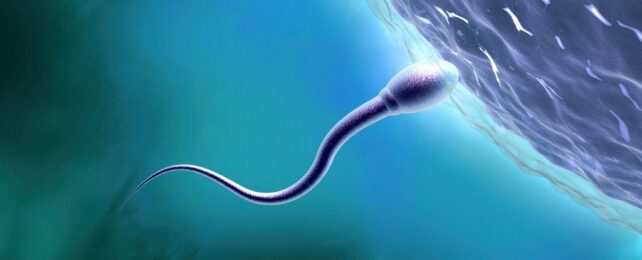Virtually every animal on Earth can thank their mother for the energy that fuels each of their cells.
The power is generated in a part of the cell known as the mitochondria, and this organelle is made entirely from a genetic recipe laid out in your mother's DNA.
A father's mitochondrial DNA, or mtDNA, plays no part. Yet the precise point at which dad's mitochondrial genes are given the heave-ho isn't a clear-cut story, with different studies supporting a breakdown in the egg's cytoplasm, and a severe edit in the sperm as it's being formed.
A recent study that sequenced the genes in human sperm cells could detect no intact mtDNA before fertilization, lending support to an early chop.
While each sperm cell contained about 100 mitochondria of its own, a team of researchers from the US and Spain found no trace of male mtDNA within the mitochondria. The sperm also lacked the transcription factors needed to maintain mtDNA.
"We conclude," the authors write, "that the mature human spermatozoa are essentially devoid of mtDNA, consistent with maternal inheritance of the mitochondrial genome in mammals."
Of course, male sex cells still contribute nuclear DNA to their offspring, and the human nuclear genome is billions of times larger than the mitochondrial genome. Even still, mutations in the latter genome are associated with a diversity of diseases and aging processes, which suggests it is quite important for health and function.
So why is it only mom's mtDNA that gets passed down?
One hypothesis has to do with the mitochondrial genome's relatively high mutation rate compared to the nuclear genome. Each cell in the body contains numerous mitochondria, which get separated into daughter cells as the parent cell splits.
The way this split happens is fairly disorganized, all things considered, which means the daughter cells sometimes don't get enough mitochondria to meet their needs. Making the few mitochondria they do receive work harder only makes splits and mutations more likely.
Because sperm cells rapidly churn through their energy trying to reach a human egg for fertilization, their mtDNA – if it did exist – would probably accumulate a bunch of mutations.
An egg cell, on the other hand, doesn't rely on its own mitochondria for energy. It saves those recipes for the future and instead sucks energy from the mitochondria of neighboring cells.
"Eggs pass on really good mtDNA at least partly because they don't use mitochondria as a source of energy," explains developmental biologist Shoukhrat Mitalipov from OHSU.
The findings do not explain why, in rare circumstances, scientists have found mtDNA transmission in some humans that looks as though it came from both the father and the mother. But it might help experts better understand some fertility disorders, which can be passed down through eggs or sperm.
In recent years, scientists have started to find ways to target specific mutations in mitochondrial DNA so they aren't inherited by offspring.
Worldwide, in fact, several children have been born with DNA from three different people, after their parents sought cutting-edge mitochondrial replacement therapy.
The incredibly unique babies have nuclear DNA that derives from the fertilization of a sperm and an egg, like any other child, but their mitochondrial DNA comes from the egg of a separate female donor.
"Maternal inheritance of mtDNA is a major paradigm that guides the existence and evolution of the vast majority of species," the authors of the recent study conclude, "however, the molecular basis of this phenomenon and its benefits have remained unclear."
For such a foundational part of life, it's incredible we don't know more about where our genes come from.
The study was published in Nature Genetics.
